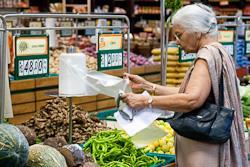
India may be on the brink of opening up its tightly regulated retail sector as the pressure of rising food prices mounts.
As he announced his budget on Friday, finance minister Pranab Mukherjee stated the country must find ways to reduce agricultural wastage and improve the efficiency of its supply chain, reported the Financial Times.
“We need greater competition and therefore need to take a firm view on the opening up of the retail trade,” Mr Mukherjee said.
“It will help in bringing down the considerable difference between the farm gate prices, wholesale prices and retail prices.”
Foreign retailers are not currently permitted to own a controlling stake in any direct-to-customer retail outlets, although companies like Wal-Mart have teamed up with local players to open business-to-business wholesale cash and carry operations.
Changing those investment rules is not likely to be an easy job, however; Mr Mukherjee said such changes did not have much support in the government.
“We haven’t reached the magic number,” he told Bloomberg last month. “We are lacking in areas where legislative support is needed.”
In the meantime, Mr Mukherjee plans to simplify the bureaucratic process in order to attract more foreign investment.
But the motivation to open up the country’s retail market is growing; Indian food prices have shot up 17 per cent in the last year, according to the Financial Times, which has put significant political pressure on the country’s government.
Hundreds of millions of Indian families spend around half their incomes on food, meaning the price rises have become a significant political issue.
Mr Mukherjee told the Indian parliament last week the rising cost of food was a result of the high level of “intermediation” in the supply chain, referring to the large number of middlemen working between farmers and consumers in India.
Large-scale modern retailers will be able to simplify the supply chain, potentially dealing with growers directly, and are likely to provide farmers with technical assistance to meet their high quality standards.
Retailers in India are currently required to buy from state-regulated markets.



